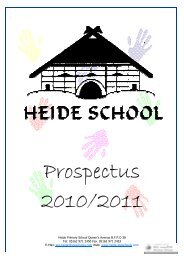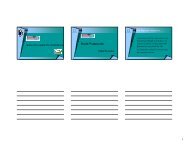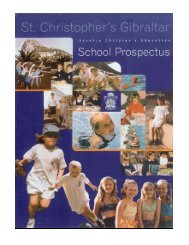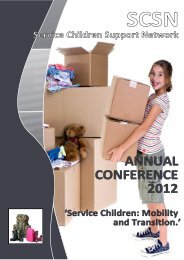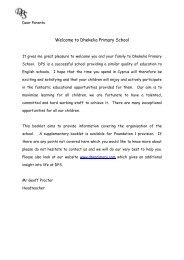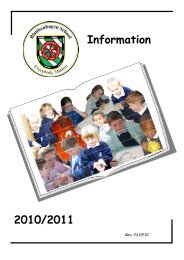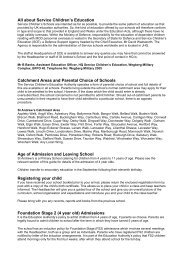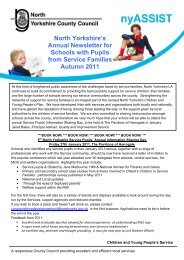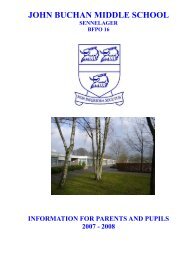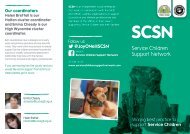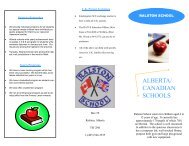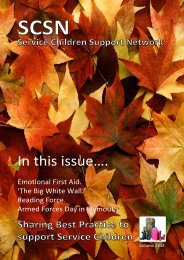Bishopspark - FS1 School brochure - Service Schools Mobility Toolkit
Bishopspark - FS1 School brochure - Service Schools Mobility Toolkit
Bishopspark - FS1 School brochure - Service Schools Mobility Toolkit
Create successful ePaper yourself
Turn your PDF publications into a flip-book with our unique Google optimized e-Paper software.
CONTENTS<br />
Welcome<br />
Admission Process<br />
How we organise the learning<br />
Learning at home<br />
Keeping in touch<br />
How we make observations, record progress and report to you<br />
Setting Staff and other Adults<br />
Extended Day Care<br />
Frequent questions answered<br />
Useful contacts<br />
2
Welcome!<br />
In this handbook we hope to share with you the most important aspects of our work in our<br />
Foundation Stage One Setting - Honeypot – as well as give you as much useful information as<br />
we can.<br />
I hope to meet all parents soon after admission - if I have not done so before - and look<br />
forward to working with you to provide the best possible provision for your child during their<br />
time with us.<br />
Honeypot is line managed by <strong>Bishopspark</strong> <strong>School</strong> but but is ‘off site’ on Barker Barracks.<br />
Unlike schools in the U.K we do not have a governing body but do have a <strong>School</strong> Advisory<br />
Committee (S.A.C) which meets regularly to discuss school matters. The addresses and<br />
contact numbers below give you the school and setting details – later in this handbook we<br />
discuss the many ways that we hope we will keep in regular contact during your child’s time<br />
with us.<br />
<strong>Bishopspark</strong> <strong>School</strong><br />
Headteacher : Mr Paul Cunningham<br />
Military Address: Paderborn, BFPO 22<br />
Civilian Address: Uhland Strasse 67, 33100 Paderborn<br />
<strong>School</strong> Office No: 79 – 3300<br />
Civilian Tel. No: 05251-101-300<br />
e-mail:<br />
sce.bishopspark@t-online.de<br />
Military Fax: 79-3301<br />
Civilian Fax: 05251-101-301<br />
Honeypot<br />
Team Leaders: Mrs Paula Jessop and Mrs Yvonne Quinn<br />
Military Address: Block 30, Barker Barracks, BFPO 22<br />
Civilian Address: Block 30, Panzer Kaserne, Driburger Strasse, 33100 Paderborn<br />
Civilian Tel. No: 05251-296603<br />
S. A. C. Chairman: Major Andrew Gladen<br />
Contact Tel. No: 79-3240<br />
Hopefully this handbook, together with your admission meeting and visit, will give you most<br />
of the information you need but please do not hesitate to ask for further details. The best way<br />
to contact me is to ring the school office and leave a message so that I can phone you back as<br />
soon as possible. We would welcome your suggestions for any changes or additions we should<br />
make to this handbook too!<br />
With Best Wishes<br />
Sue Barry<br />
Foundation Stage Leader<br />
3
A Message from the Headteacher<br />
I would like to take this opportunity to welcome you and your child to <strong>Bishopspark</strong> <strong>School</strong>. It<br />
is our aim to educate all children to the best possible standard that each individual can attain<br />
whether he/she has learning difficulties, learns ‘normally’ or is a more able child. I hope that<br />
we can work in partnership to achieve this and if at any time you have a concern please pop<br />
into school and discuss it with me. Your child’s education, welfare and happiness are of prime<br />
importance to us.<br />
This booklet, I hope, will provide you with basic information about our Foundation Stage One,<br />
what it does and what it stands for. What it can never do is to take the place of actual contact<br />
between home and setting, parent and practitioner. I look forward to seeing you in school and<br />
wish you and your children a happy and successful stay in Paderborn. Please do not hesitate to<br />
contact me if you have anything that you wish to discuss about your child’s education.<br />
P. V. Cunningham<br />
Head Teacher<br />
SERVICE CHILDREN’S EDUCATION<br />
As far as possible <strong>Service</strong> Children’s Education provide the<br />
same pattern of education as that given in UK. The<br />
education will conform, therefore, in type and scope to that<br />
provided in England and Wales under the Education Acts.<br />
Within the MOD the responsibility for <strong>Service</strong> Children’s<br />
Education (SCE) is vested in the Secretary of State for<br />
Defence. <strong>Service</strong> Children’s Education (SCE), is<br />
responsible for the administration of schools world-wide. The responsibility for SCE to which<br />
<strong>Bishopspark</strong> <strong>School</strong> belongs, is vested in the Commander in chief UKSC (G) who exercises<br />
this responsibility through the Commander Education UKSC(G).<br />
The professional direction and general internal administration of schools in our area are under<br />
the day to day control of a civilian, The Chief Executive SCE, who is on the staff of the<br />
Commander Education UKSC(G) and there are Assistant Chief Executives at Rheindahlen<br />
who have first line responsibility for all schools. The name, address and telephone number of<br />
the Assistant Chief Executive for <strong>Bishopspark</strong> <strong>School</strong> is:-<br />
Mr P Niedzwiedski<br />
Assistant Chief Executive (Operations)<br />
HQ SCE<br />
BFPO 40 Telephone: Wegberg Military (67 2319)<br />
4
Admission Process<br />
We are able to offer children a part time place (five sessions of three hours each session) in the<br />
term after their third birthday. The statutory or ‘legal’ start date for children in full time<br />
education is their fifth birthday – attendance at a Foundation One Setting is not a legal<br />
requirement. As term dates and holidays can vary each year, S.C.E have put particular dates in<br />
place in order to make admission points clearer.<br />
A child who is three by August 31 st is entitled to a place in the Autumn term.<br />
A child who is three by December 31 st is entitled to a place in the Spring term.<br />
A child who it three by 31 st March is entitled to a place in the Summer term.<br />
Unfortunately we are unable to offer places to children outside these dates – even when a<br />
birthday falls just outside the ‘cut off date’.<br />
We are able to offer some Extended Day Care Places after the normal session times for which<br />
parents need to pay – please ask us if you are interested in Day Care for your child.<br />
We have an admission process in place that we hope will ensure the best possible start for your<br />
child within the setting – whether they are joining us from another setting or joining a setting<br />
for the first time and at whatever age. The process involves an admission meeting and at least<br />
one visit to the setting with a parent or carer.:<br />
Children joining the setting following their third birthday – already living in Paderborn area.<br />
If you know that you may need a place for your child in the future please contact the <strong>School</strong><br />
Office (main site) by calling in or phoning. The Office will take your contact details (name,<br />
child’s date of birth, quarter and postal address) and keep them on file. Toward the end of the<br />
term before your child is eligible for a place we will contact you, send a copy of this handbook<br />
and invite you to an admission meeting. We try and hold admission meetings two or three<br />
weeks before the end of term and invite only a few parents to each meeting to ensure we have<br />
plenty of time for discussion.<br />
At the meeting we will complete the official paper work for registration with the school<br />
(please bring along your child’s birth certificate and a copy of this handbook if you have<br />
already received one) and an initial profile of your child which gives you the opportunity to<br />
tell us about your child – their likes and dislikes, development, medical or diet needs etc. We<br />
will also take the opportunity to explain many of the points in this handbook and to show you<br />
around the setting answering any questions you may have. You do not need to bring your child<br />
along to this meeting but of course you may if you wish.<br />
At the admission meeting we will also arrange at least one visit to the setting for your child<br />
with a parent or carer. This visit is important to help you and your child have some time in the<br />
setting together exploring some of the activities we offer, perhaps also staying for snack and<br />
meeting some of the other children and staff. If you have any further queries or concerns we<br />
can discuss them at this time. This visit allows you greater opportunity to support your child at<br />
home as you have a shared experience of the setting to build upon.<br />
5
Children joining the setting due to a recent move to Paderborn – already three years old.<br />
If you have just moved to the area and would like your child to start in with us in Foundation<br />
Stage One please contact the school office (main site) as above and leave your details. We will<br />
contact you as soon as possible to arrange an admission meeting and a visit for you and your<br />
child to the setting. If your child has been attending another setting please bring along any<br />
records you may have and also your child’s birth certificate.<br />
Settling in<br />
Starting at a setting away from home can be a big step for some children (and their parents!)<br />
and we try hard to make the early days as smooth as possible. Here are some ideas that you<br />
may want to use in the first days or weeks of your child being with us:<br />
• Be positive about the setting when you discuss it at home with your child – talk about<br />
their favourite activities or friends they may meet. If you have concerns or questions<br />
then discuss them with us not your child!<br />
• Decide how you will organise the first day or two, it is often easier to try and decide<br />
what you will do and then not change your mind as this can lead to uncertainty in your<br />
child’s mind. For example agree with you child that you will stay (all morning or for<br />
some of it) or that you will be going home and coming back later to see them.<br />
• Leave your child in the setting for a short time – perhaps building up to a whole<br />
session over a few days.<br />
• Phone us at the setting if you would like to know how your child is getting on.<br />
• Be enthusiastic about any activities your child has explored during the session. They<br />
may like to show you where they have been working or a painting etc that they have<br />
made.<br />
Many children have very few, if any, settling in concerns and are happy to join the setting<br />
routines without any difficulty. Some may seem very happy at first and then become less sure<br />
after a few days, others seem very unhappy and then suddenly settle completely! All these<br />
responses are ‘normal’ and the staff are experienced in dealing with them. Please discuss any<br />
concerns you have with us and we will do our best to support your child.<br />
6
How we organise the learning<br />
We work hard to try and best support your child’s development during their time with us.<br />
There are many ways in which we do this – some are more obvious than others! The way in<br />
which we organise all aspects of learning in the settings is based in government guidance<br />
which can be found in ‘Curriculum Guidance for the Foundation Stage’. We have copies in the<br />
setting entrances for you to look at, or you can order your own copy (see ‘useful contacts’ at<br />
the back of this handbook).<br />
The Shape Groups<br />
All the children belong to their own small group with a shape name – the triangle group for<br />
example – and one particular adult leads each group. This adult (we call adults working in the<br />
setting ‘practitioners’) will be the person who gets to know your child really well and who will<br />
spend most time with your child. The group meets first thing every morning in their special<br />
place within the setting and later they will share snack together and undertake one activity<br />
together. In this way we are hoping that the children experience the security of a small group<br />
where they can form close relationships with the other children and one particular practitioner.<br />
This system also enables each practitioner to closely track and support the learning for each<br />
child in the group.<br />
Each shape group has a set of coat pegs and trays close to their area where the children keep<br />
their things. Each child also has a name card with their shape and own photograph on for them<br />
to find in the morning. The cards have a magnetic strip attached so that the children can fix<br />
them to the board in their area. Each group has their own board which they use to help discuss<br />
the session, work they are doing or have completed. The groups also soon learn the various<br />
shape names!<br />
We group the children in a variety of ways but try to keep each small group as much of an<br />
even balance when we can. At the Christmas and Easter intakes we may keep the younger<br />
children in their own group or groups when this is possible. Sometimes there may be a need to<br />
change a child’s group but we would discuss this fully with parents beforehand.<br />
The session structure<br />
You will see below an outline of the morning session and timings with a brief description of<br />
some of the learning opportunities within each. We aim to provide a mixture of opportunities<br />
throughout the morning between independent or child led work with adult led or more<br />
‘structured’ activities, time in a large group sharing the space and resources with time in a<br />
smaller group, time inside with time outside the building, time with the small group and time<br />
with other practitioners and children.<br />
Each part of the session offers a range of opportunities for learning and development. Snack<br />
for example, is an ideal opportunity for the group to develop language skills, to practise<br />
sharing as a group, celebrating special events like birthdays, to develop maths skills as they<br />
count out cups or pieces of fruit, to extend their physical skills as they pour drinks, spread<br />
cheese or use safe knives to cut.<br />
During the independent play session the children are encouraged to plan themselves where<br />
they will work within the setting. Each room is known by a colour and will be supported by<br />
the practitioners during the session. The practitioners spend a few weeks in each room or<br />
outside area and then swap so that children will meet different adults in the various spaces.<br />
7
During the last session of the morning the group meets to undertake an activity led by each<br />
practitioner. Within a fortnight these activities will always include a music session, a<br />
cookery/kitchen activity and sometimes a structured ‘movement’ or physical skill session.<br />
Each week the group will be offered the chance to change their ‘library’ books. The adult led<br />
activities are planned to be appropriate for the children’s age and development. Typical<br />
activities may include a game, a painting activity, a challenge in the construction area, a<br />
‘making’ activity such as a model, or a discussion etc.<br />
We try and take the children out every morning that the weather possibly allows for some<br />
much needed fresh air and exercise. All children need waterproof foot wear and warm outer<br />
clothing. We have a range of bikes, tricycles, climbing apparatus and many other opportunities<br />
to extend all areas of development outside. We are currently planning to extend the<br />
opportunities we offer outside and if you would like to help in any way please let Sue Barry<br />
know!<br />
8.45 Children enter the setting, change out of coats etc, select their registration cards<br />
and meet together in their ‘shape groups’ to plan what they will do during the<br />
next ‘child led’ or independent session.<br />
9.00 Children move to their chosen activities in whichever area they have planned to<br />
work. They may move between different activities freely.<br />
10.05 Tidy up time – children stay in whichever area they are working when the ‘tidy<br />
up music’ starts and help with clearing away.<br />
10.15 Children meet back in their ‘shape groups’ to share what they have been<br />
working on with their group. The children are encouraged to bring something<br />
they have been working with – a model, a painting, a book etc – so that the<br />
group can discuss, and question each other about, their different activities.<br />
10.25 Snack time – each shape group has a rota whereby one child each day is the<br />
‘special helper’ and serves the other children.<br />
11.45 Fresh air time – all the groups meet together to spend time accessing the outdoor<br />
environment including the bikes, the climbing apparatus, role play, ball games<br />
etc.<br />
11.15 Adult led – the group undertakes an activity planned and led by the adult. These<br />
activities vary but regularly include a kitchen based activity, a music session and<br />
library book changing.<br />
11.45 Parents / carers come in to pick up children at the end of the session<br />
8
How we support learning through the environment in the setting<br />
We are constantly reviewing the environment in and outside the setting to ensure that it<br />
supports development for the children. Each area that the children access during the child led<br />
session is carefully planned to provide a range of learning opportunities – the sand tray offers<br />
resources to support mathematical experiences such as heavy and light as well as a number<br />
line for example to encourage counting and number recognition. The writing area may have<br />
lots of opportunities for communication and literacy work but also offers opportunities to learn<br />
physical skills in holding a variety of mark making equipment or folding and storing paper.<br />
We use signs and notices to support the children’s awareness of writing and reading and<br />
encourage the children to tidy up and put away after they have worked in an area using the<br />
labelling to help them. We use display to show that we value the children’s work and also as a<br />
resource – an abc frieze or the birthday board for example. We encourage the children to take<br />
pride in and care of the setting and encourage good habits in how they use resources, replace<br />
equipment and show respect for the environment as well other children’s work.<br />
How we plan<br />
The children are themselves involved in planning their first ‘child led’ activity of the morning<br />
when they decide where they will work and what they will do. As this process develops over<br />
the year the children may be able to return to work they start one day the next, for example<br />
they may make a model one day and decide to paint it the next or they may decide to extend a<br />
role play with friends by asking for different props or dressing up.<br />
We use the Government produced Curriculum Guidance for Foundation Stage (see contacts<br />
back page) to help with our planning. The Guidance divides young children’s learning into six<br />
areas which are:<br />
• Personal, Social and Emotional<br />
• Communication, Language and Literacy<br />
• Mathematical Development<br />
• Physical Development<br />
• Knowledge and Understanding of the World<br />
• Creative Development<br />
These areas act as a guide to the kinds of activities and experiences that we need to provide for<br />
the children. Most learning, however, overlaps many of the areas at any one time and so any<br />
one experience will offer learning opportunities within many areas.<br />
The practitioners plan as a team as well as for their own shape group. We follow medium term<br />
plans, or ‘units’ with learning intentions drawn from the curriculum guidance. A unit may be<br />
centred on a particular theme such as ‘nursery rhymes’ for example and will cover all six areas<br />
of learning. We may plan to offer opportunities to meet the learning intentions through how<br />
we set up the environment, through how we organise the snack, cooking activities, the music<br />
session and during the adult led activity.<br />
We also plan to support learning through ongoing or ‘everyday’ aspects of the children’s<br />
experience. For example, the way we organise the daily registration supports the children’s<br />
name recognition, how we model behaviour and support children in the way they share or sort<br />
out difficulties supports their personal development and our enthusiasm for exploring and<br />
discovery as adults encourages children’s own positive attitude to learning. The notice board<br />
in the setting entrance will display aspects of our current planning – please ask for more<br />
details if you would like them.<br />
Learning at home<br />
9
Your child only spends a small part of their day with us in the setting and so the experiences<br />
you offer them are even more important. We are working on producing more detailed<br />
guidance alongside our planning to give parents and carers ideas of how to support the<br />
learning we do in the setting at home.<br />
By spending time with your child in the setting – on Friday mornings perhaps - you will learn<br />
more about what they are interested in and be able to support them at home. There are also<br />
some good websites and publications which have advice for parents – see the back page of this<br />
hand book.<br />
Here are some general points which may be of help:<br />
• Praise your child for all their achievements (however small) and help them build a<br />
strong sense of what a good person they are!<br />
• Take proper time to discuss events and experiences with your child showing a real<br />
interest in how they make sense of the world around them. It doesn’t always have to be<br />
anything new and exciting! Young children will be interested in the fruit and vegetable<br />
shopping if you talk to them about it! Being able to use spoken language is crucial to<br />
later being able to read and write.<br />
• Spend some time everyday sharing different kinds books and reading to your child.<br />
Join the local library and make a weekly visit. Show them by reading yourself how it<br />
looks to be a reader or use books together such as recipe or DIY books.<br />
• Play games and jigsaws with your child – these will help social skills, language, maths,<br />
physical skills, creativity and knowledge and understanding of the world. Everything in<br />
fact!<br />
• Use maths talk when you can – for example count the stairs or the plates on the table,<br />
talk about full/empty, long/short etc, notice numbers around you on signs or on houses,<br />
use shape names and talk about time as it passes through the day and week.<br />
• Give your child opportunities to develop physically by visiting the play park, going<br />
swimming and playing outside. Young children need to develop all their muscles<br />
through vigorous activity so that they can also develop small movements such as<br />
holding a pencil and doing up buttons.<br />
• Involve your child as much as you can in day to day routines giving them real jobs to<br />
help with which will give you opportunities to talk together and for them to develop a<br />
range of skills. Some ideas might be laying the table, unpacking the shopping, putting<br />
the washing on, helping in the garden, sweeping up, cleaning the car … the extra time<br />
it takes will be worth it for their learning!<br />
10
Keeping in touch<br />
We are committed to working closely with parents and hope to build a good relationship so<br />
that together we can best support your child’s development. We are constantly reviewing how<br />
we can best do this and would welcome your ideas and suggestions. Here are some of the<br />
ways in which we hope to keep in touch:<br />
• At the end of the session when you collect your child there is the opportunity to talk<br />
briefly with your child’s ‘group practitioner’ perhaps sharing what has happened<br />
during the session.<br />
• At the beginning of the session, when you bring your child in, the group is busy about<br />
to start on the first part of the morning activities and so there is less opportunity to talk<br />
with the practitioner but there is always someone – usually the Team Leader –<br />
available for any general queries or messages.<br />
• If you would like the chance to discuss something in more detail with either the Group<br />
Practitioner, the Team Leader or the Foundation Stage Leader please don’t hesitate to<br />
ask and we can arrange a good time. You can either ask us in person or ring the Setting<br />
number or ring the <strong>School</strong> Office number to arrange a time.<br />
• You are welcome to stay and join in any time and on any day but we also keep Fridays<br />
as ‘Stay and Play’ mornings when parents are particularly encouraged to stay and join<br />
in with the first session (when the children choose their activities). Coffee and tea is<br />
available on Friday mornings between 9.45 and 10.30. We are always on the look out<br />
for parents to help out with Friday morning drinks.<br />
• We hold regular events when we invite parents in for a particular reason – to tell a<br />
story for example or to come and watch the Karneval procession or a hands on day at<br />
the weekend to help with projects in the setting.<br />
• We produce a regular (usually fortnightly) newsletter to keep you informed about<br />
general issues and dates. This and the <strong>School</strong> Newsletter are kept on the notice board<br />
as you come in.<br />
• There is a white board in the entrance which may have daily notices or reminders.<br />
• We hold occasional meetings or workshops to discuss particular topics – helping with<br />
reading for example.<br />
• We occasionally invite all parents in to make an appointment to discuss their individual<br />
child’s progress – usually toward the end of each term.<br />
• A written message of any kind will be ‘posted’ in your child’s tray.<br />
• Parents are always welcome to ask to see their child’s observation notes at any time<br />
throughout the year.<br />
11
How we make observations, record progress and report to you.<br />
An important aspect of our role as practitioners is to observe children’s learning in a variety of<br />
situations so that we can find out what the children can do, or do know, so that we can support<br />
them in the ‘next step’ of their learning. For example, a child playing in the sand might find it<br />
difficult to share the toys with other children and so we need to make sure we offer<br />
opportunities to help them share and take turns, a child might use scissors well but not be<br />
using a ‘tripod grip’ holding a paintbrush or pencil and so they need support to develop the<br />
right physical control. We write down some of the observations we make – either on our<br />
planning or on each child’s set of notes. These notes are completely confidential between the<br />
staff in the setting and the parents. You are welcome to see them at any time and we will be<br />
sharing them with you whenever we meet.<br />
The Curriculum Guidance gives us a broad outline which helps us chart children’s<br />
development within each of the six areas. Each outline is broken down into ‘stepping stones’<br />
and are very roughly graded so that the first stepping stones are yellow, then blue, then green<br />
and finally the grey stepping stones give an idea of where most children will be working by<br />
the end of their year in Foundation Stage Two. No two children are the same, however, and<br />
will not all progress through the stepping stones or the colours in the same way or at the same<br />
rate. Neither is it a race! We only use the stepping stones to help us plan children’s learning<br />
and to help us make sure that they are making progress. We will use our observations to make<br />
broad judgements about how the children are working compared to the stepping stones and<br />
record these regularly.<br />
All these observations and judgements are open to you as parents but we will also collect them<br />
up and write a very brief report – more of a pen portrait of your child – when your child moves<br />
to another setting whether this is Foundation Stage Two of the school or elsewhere during<br />
Foundation Stage One.<br />
Setting Staff and other Adults<br />
You will soon know the regular staff at the setting who will have been interviewed and given a<br />
full security check before being offered a permanent contract. We also occasionally have<br />
supply staff working with us when practitioner is ill of away for any reason. We may also be<br />
visited by other S.C.E staff such as a curriculum development teacher for music or an<br />
inclusion development teacher who may work with children or support staff in the setting.<br />
Occasionally there may be adults from other agencies working in the setting such as an<br />
Educational Psychologist or Speech Therapist. If your child is involved in these visits then we<br />
would have always discussed it beforehand and consented to any such involvement.<br />
Extended Day Care<br />
The extended day care session runs from 11.45 until 1.15 or until 2.45 each week day. The<br />
session is not part of the funded provision and parents who wish to access the provision need<br />
to pay. The session cost is set by S.C.E and parents receive a bill, payable in advance, from the<br />
school office. Places in extended day care are limited due to staffing and there may be a<br />
waiting list for places. Please ask for further details if you are interested.<br />
12
Frequent questions answered<br />
• What does my child need to wear?<br />
The children need to wear comfortable clothes that they can play in and not worry about<br />
getting a little paint or play doh on! Clothes which the children can take on and off themselves<br />
when using the toilet are also best. All the children also need a pair of wellies at the setting<br />
and each group has a box near their pegs where they can keep their wellies. Some children<br />
wear wellies in each morning and keep slippers at the setting to wear in the building. Shoes or<br />
slippers worn in the setting need to be safe – slip on style slippers are not very safe and neither<br />
are heels! We do try and get some fresh air every morning and so your child needs clothes<br />
outside to suit the weather – at least drizzle proof, warm hats and gloves etc or sun hats for the<br />
summer. During hot weather we ask parents/carers to apply sunscreen at home in the morning<br />
which for most children will provide protection for the morning. If your child who needs more<br />
sun screen please discuss with us.<br />
• Do I need to send in a snack?<br />
No – we provide snack at the setting and use it to support learning opportunities for the<br />
children. We offer milk or water and a variety of healthy snacks such fresh fruit, cereal,<br />
yogurt, toast etc. We ask for a voluntary contribution from parents to cover snack and small<br />
ongoing expenses such as buying cooking ingredients. You will receive a bill from the school<br />
office for your snack contribution.<br />
• Can I send in something special for snack when it is my child’s birthday?<br />
Yes! The children enjoy sharing birthday celebrations together and snack is the ideal<br />
opportunity. A small fairy cake for each child in the group or any other treat is fine but not<br />
sweets. If you would prefer your child not to have any of these occasional birthday snacks<br />
please let us know. We have a no nuts policy in the setting in line with school policy.<br />
• Is it alright if my child would like to bring in a toy?<br />
Many children will be happier, especially in the early days, if they can bring in a special toy or<br />
comforter from home and this is absolutely fine. Later we encourage children not to bring in<br />
toys from home so that they don’t risk losing them or getting them muddled up with toys from<br />
the setting.<br />
• What happens if my child is ill or has an accident?<br />
If your child is unwell they should not be at the setting – young children who are not well will<br />
be uncomfortable and not able to enjoy the session or learn as they need to. Please keep your<br />
child at home if he / she is not well and let us know by ringing us. If your child seems unwell<br />
during the session we will ring you and ask you to come and pick him / her up. Please keep the<br />
phone numbers we hold for you up to date! In the very unlikely event of an emergency or any<br />
accident we will take the advice from our own trained First Aider and contact you as soon as<br />
possible. If your child does have any sort of accident during the session the staff will complete<br />
an ‘accident report’ so that we can keep a record and ask you to sign the form when you come<br />
in to pick your child up.<br />
13
• What happens if my child wets or soils themselves and needs changing?<br />
We have some spare clothing in the setting and will help children change themselves if they<br />
have this kind of accident – please return the washed clothes to the setting. If you prefer you<br />
can leave a small bag of clothes on your child’s peg for when they need them. If your child has<br />
particular toileting needs then please discuss them with us.<br />
• Can we borrow library books from the setting?<br />
Yes – each week your child will be able to choose a book (as long as they have brought the<br />
last one back!). Each group has a particular day of the week when they visit the library area –<br />
please ask or see the notice board for details. We have school book bags available to buy at the<br />
setting and encourage children to have one to help protect the books.<br />
• Can someone else ever pick my child up?<br />
We need to know that we can keep the children safe and will not let another parent or friend<br />
take your child even when it’s someone we know unless we have clear instructions from you.<br />
We have a form that you can fill in to name a particular friend who you are happy to pick up<br />
your child if you are ever late or, in an emergency, you may phone the setting to let us know<br />
that someone else is picking up your child.<br />
• How can I help out at the Setting?<br />
We are always keen to hear from parents who would like to help in any way. You might be<br />
able to support children’s activities, help with Friday morning coffee or prefer something more<br />
practical like helping with display or with the garden. Please let us know if you would like to<br />
help out and we can discuss what you would like to do. Any adults helping on a trip or in the<br />
setting need to have a List 99 check, which is a very basic security check, ensuring that we can<br />
keep the children safe. The school office can organise these checks easily.<br />
• Can my friend pick my child up?<br />
We must have your permission to allow your child home with anyone else. If it is a short<br />
notice emergency then please let us know verbally or by phone, if it is likely to be more often<br />
please complete the permission slip (copies are in your starter pack).<br />
14
Useful contacts<br />
We have some leaflets and books etc that may be useful for parents in the setting<br />
which you may like to look at or borrow.<br />
Curriculum Guidance for the Foundation Stage – copies available by phoning 01787 884444<br />
or fax 01787 312950. Order reference: QCA/00/587 – a really useful folder that parents can<br />
use at home.<br />
Local library – opposite Honeypots on Barker Barracks – check for latest opening times<br />
www.early-education.org.uk/<br />
www.parentscentre.gov.uk/<br />
www.surestart.gov.uk<br />
www.booktrusted.com/<br />
www.pre-school.org.uk<br />
www.raisingkids.co.uk<br />
www.underfives.co.uk<br />
15



